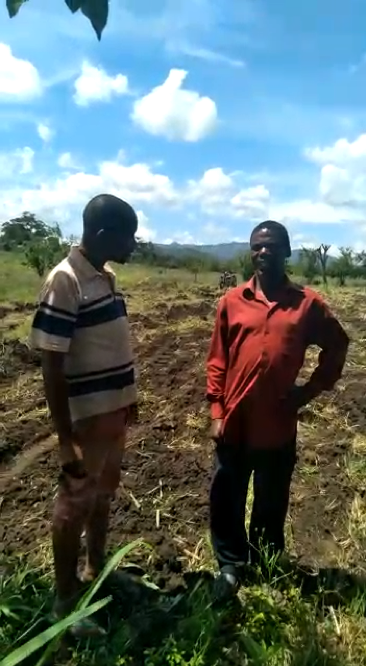The Tractor and Food security - feeding the community
The only occupation for more than 90% of Tunguli villagers is farming. This makes the success of agriculture a matter of survival and, if done well, a means to earn their way out of poverty. This page summarises the work MM is doing alongside the villagers of Tunguli to improve farming methods in sustainable and appropriate ways. As the project moves forward this page will be updated with the latest developments.
December 2020 Update
The tractor is now very busy. The rains have started and it is the right season for maize planting so farmers are busy preparing their fields. An agricultural revolution has taken place in recent years with a shift from the use of hand hoes to oxen plough and tractor plough bringing greater demand for tractors. The village tractor has meant that villagers are now less reliant on outside contractors who charge high prices and this is good for the community.
Charles Matuta is a farmer at the hamlet of Bungoma. He decided to use the tractor for many reasons. His farm was covered with tall and hard grasses which is impossible to hand hoe or for oxen to plough and the tractor saves him a lot of time and means he is able to cultivate and plant on the same day. Charles also says ‘the tractor does not compact the soil, as oxen do, which reduces water run-off and improves moisture retention giving better plant growth’. Charles is planting maize and pigeon peas.
We are also delighted to report that the tractor committee is taking good care of the tractor and ensuring it is operated effectively. One example is that they are now buying diesel fuel in bulk from filling stations rather than in small quantities from local sellers which is normal in remote villages such as Tunguli. This has reduced the cost of fuel by almost 30%. A recent breakdown of the tractor was also fixed quickly so that it could continue to work during this busy season. A steering link broke and a replacement part was not available locally. The committee quickly decided to have it welded nearby and the tractor was soon back in action.
September 2015 Update
2015 was a key year for Mission Morogoro, with major developments in our Food Security Project for Tunguli. Early in the year the long process of refurbishing the Massey Ferguson 265 tractor, by a team at Moreton Morrell College, was nearing completion, so it was decided that the time was right to buy a farm trailer to go with it. A suitable, but very tired, farm trailer was found locally but it clearly needed a complete overhaul to make sure it was ready to be shipped with the tractor. It became obvious that the bed of the trailer was heavily corroded and would need to be replaced. We were grateful for James Barrett’s skills and patience in producing a completely new bed. The Moreton Morrell team then refurbished all of the mechanical and hydraulic elements of the trailer, before it was painted and fitted out with new boards.
Ripper plough about to start work
The third item needed was a plough to cultivate the compacted African soil. Based on the advice of experts in Tanzania, a ‘ripper’ plough was sourced and, again, refurbished. Here is the 'ripper' mounted on the tractor ready to start work.
While all this activity was going on, Mission Morogoro began researching Conservation Agriculture – a new and exciting way of farming being introduced into Africa. The Conservation Agriculture approach helps prevent soil erosion, gives better crop yields and retains the nutrients in the soil rather than depleting them and making soil unproductive. The exciting discovery of this method of farming met our hopes for sustainable use of the farming equipment we were sending and aligned with Mission Morogoro’s aspirations for the project as a whole.
Local farmers following training
We have been fortunate to form a strong link with an African NGO, known as ACT (African Conservation Tillage network), whose support we are receiving to introduce Conservation Agriculture methods into Tunguli. During our August visit we were thrilled to be able to attend a 2-day training, delivered by ACT, in Tunguli alongside 38 local and enthusiastic farmers. Since our return we have set in motion a 3-year plan for the Tunguli Food Security project.
Our visit also saw the construction of a metal building for the secure storage of the agriculture equipment. Sue and James Barrett had created the building in the UK, based on their own design, and it was shipped, flat-packed, in the container alongside the machinery. Taking the opportunity to involve and train local people in the skills and equipment they used, they quickly erected the building in the heart of the village and it now houses the tractor, ripper plough, tools and workbench needed to support the project. In addition it was vital for some of the villagers to be trained in tractor driving skills and, as a result of the training course run, a head tractor driver was appointed to continue that training on our return to the UK.
Completed workbench and tools
The building being erected
The tractor and its shed
Tractor driver training
Planting cover crops December 2015
Since our return a government Extension Officer has been appointed and, under the supervision of ACT, he will oversee the technical aspects of the project in Tunguli. In the longer term the conservation agriculture project will extend training out from Tunguli to the surrounding villages. The 38 farms, meanwhile, will be provided with improved seeds of cover crops and maize to plant each year for 3 years. A water reservoir will be excavated with a concrete wall to provide water for irrigation and, water will also be available for village use from a new bore- hole. To help combat the problems of erosion, Agroforestry tree seeds will be supplied to provide trees for planting around the village.
These are exciting and challenging times in our project and our wish is that these initiatives will make a sustainable difference to the villagers living in and around Tunguli.






